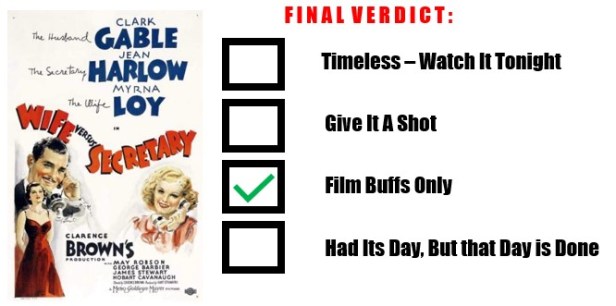

In 1936, long before Gone With the Wind hit the big screen, Clark Gable was already the undisputed King of Hollywood.
He’d starred in back-to-back Oscar Best Picture winners—It Happened One Night (1934), for which he also won the Best Actor award, and Mutiny on the Bounty, the top-grossing film of 1935.
He was the quintessential hot-blooded American man who got pulses racing.
He’d been paired with Jean Harlow before—most successfully in Red Dust (1932), one of the best pre-code films (and far superior to John Ford’s 1953 lackluster remake Mogambo.) Harlow was at her best as the wise-cracking prostitute Vantine, and the chemistry between them all but melts the screen.
Myrna Loy (who’d also previously starred with Gable in several films) was fresh off her success as Nora Charles in The Thin Man (1934). She played opposite William Powell as the devoted couple who fought crime and traded witty barbs. The duo would go on to make five more Thin Man films, becoming one of the most beloved duos in film history.
So throwing these three together—Gable the Sex Symbol, Harlow the seen-it-all-done-it-all blonde bombshell, and Loy the pretty face with a witty mind to match—should been absolute dynamite.

But instead of letting them do what they do best, Wife Vs. Secretary played all three against type.
As Myrna Loy herself said of the film:
The script was such a reversal of the types we usually played. Clark was supposed to be the faithful, steadfast husband. Jean was the other woman but played it very prim and proper. I was the sexiest wife that I’d ever been allowed to play.”
Gable plays Van Stanhope, a rich and well-loved magazine executive happily married to Linda (Loy.)
Their marriage is idyllic—she’s supportive of his career, he remembers their anniversary, and they float along in a bubble of love and trust.
Until people start asking Linda—again and again and again—if she’s worried about Van’s secretary Helen (Whitey) Wilson.
Played by Jean Harlow, Whitey at first appears to be every wife’s nightmare—an attractive woman who’s made herself indispensable to Linda’s husband.
Whitey is Van’s right arm at work—she manages his calendar, takes notes in every meeting, knows the location of every file, types every document.
She’s at Van’s beck and call, day or night—much to the exasperation of her boyfriend Dave (a small part played by up and comer Jimmy Stewart.)

Van needs her so much, in fact, that he blocks her from receiving a well-earned promotion to keep her with him.
Linda knows Whitey, and never thought anything of it until the whispers started. Her own mother-in-law warned her that she should get rid of Whitey—that no man could be expected to resist the kind of temptation Whitey offers.
At first Linda brushes off the warnings, but once they lodge in her head, she sees the relationship between Van and Whitey in light clouded by suspicion. Unbeknownst to Linda, Van is working on a covert takeover of a competitor, and his secrecy makes her believe he is having an affair with Whitey after all.
But Linda is wrong—Van’s only mistress is his work, and he’s never thought of Whitey as anything but a trusted colleague. As for Whitey, it’s clear she’s a little bit in love with Van—but knowing his devotion to his wife, she would never show it.
Damning evidence mounts against Van and Whitey—though they are innocent, Linda cannot be faulted for eventually thinking they are having an affair after she catches then in several seemingly compromising positions.
She’s ready to throw Van over, and Whitey finally has her chance. But realizing that Van will never love her the way she loves his wife, Whitey instead schemes to get them back together.
A secretary with a heart of gold.
And a happy ending for all, including Whitey, who eventually marries her own boyfriend.
Wife Vs. Secretary is a film that mostly disappoints. Not because it’s terrible, but because when you have Gable-Harlow-Loy on the marquee, the expectations are high.
Especially in light of Jean Harlow’s early death—because she got so few chances, it makes every misfire all the more painful.
In the end, I can’t help but lament Wife vs. Secretary as a lost opportunity.

Sources
Harris, Warren G. Clark Gable: A Biography. 2002.
Well that’s a shame then!
I suppose you can’t win them all, but I had such high hopes for this one!
Maybe too much adherence to Faith Baldwin’s novel? This was well reviewed at the time and was expected to be a box office hit…
Perhaps. It’s not a terrible film, it just feels like a waste of the talent involved, especially Harlow.